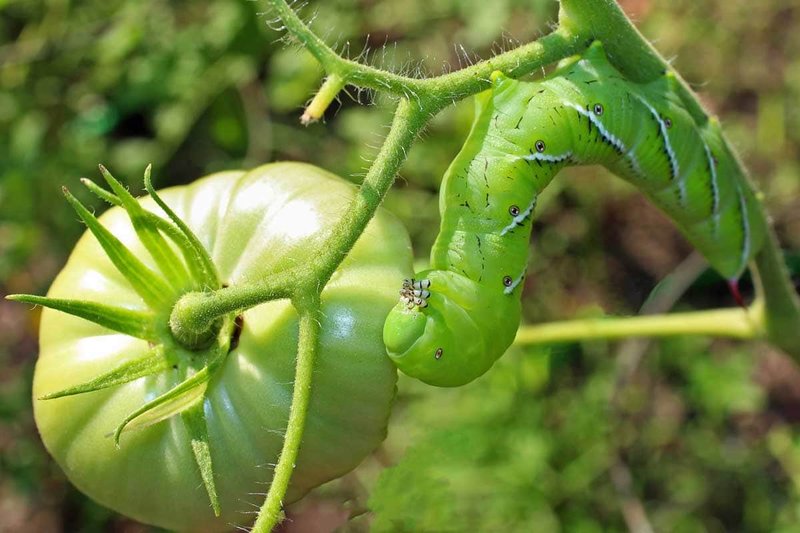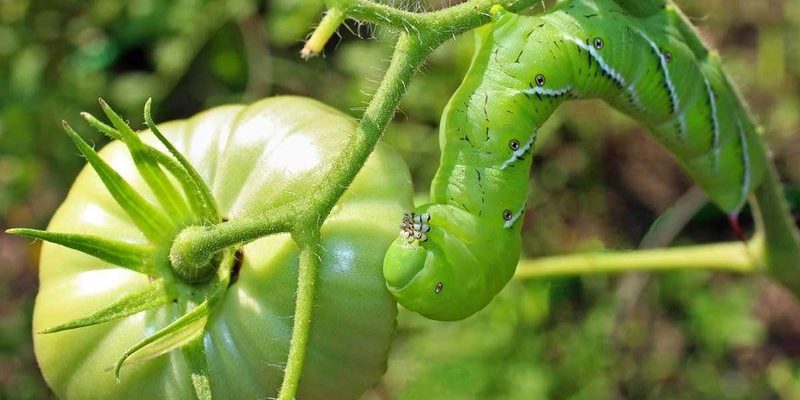
Hornworms are like those uninvited guests at a party who just can’t resist the buffet table. They’re particularly drawn to tomato plants, and many gardeners find themselves scratching their heads, asking, “What gives?” In this article, we’ll break down the factors that attract hornworms to your precious crops, giving you the know-how to protect your garden and help your tomatoes thrive.
What Are Hornworms?
Hornworms are the larval stage of certain moths, primarily the five-spotted hawk moth and the yellow-striped armyworm moth. They’re notorious for their insatiable hunger and can strip a tomato plant bare in just a few days. Typically, they’re bright green, about 3-4 inches long, and have a little horn-like structure on their rear, which is where they get their name. If you spot one, it might remind you of a mini dinosaur!
Their life cycle begins when adult moths lay eggs on the leaves of tomato plants. Once those eggs hatch, the hornworms emerge and start devouring whatever they can find. This is when they can wreak havoc in your garden, leaving many gardeners feeling frustrated. So, what exactly pulls them toward tomato plants?
Factors That Attract Hornworms
1. Availability of Food
Tomato plants are a hornworm’s buffet. These little pests are primarily herbivorous, meaning they thrive on foliage. It’s not just the tomatoes that attract them; they love the leaves, stems, and even the fruit. If you’ve got a lush tomato plant, it’s like setting up a feast for these hungry critters.
But here’s the thing: hornworms aren’t just picky eaters. They prefer plants from the nightshade family, which includes not only tomatoes but also peppers, eggplants, and potatoes. If you’ve got several varieties of these plants in your garden, you’re basically sending out an invitation to hornworms.
2. Warm Weather
Ever notice how certain pests seem to come alive when the weather warms up? Hornworms are no different. They thrive in warm climates, which makes summer their prime time for feeding and breeding. During these hot months, they can quickly multiply and cause more damage, as the warm conditions are ideal for both their growth and the development of their eggs.
So, if you’re in an area with a temperate climate, expect hornworms to be on the prowl when the temperatures start rising. It’s like a summer barbecue for them, and your tomato plants are the main course.
3. Lack of Natural Predators
In a balanced ecosystem, every pest has its predator. However, when natural predators are scarce, hornworms can run rampant. Birds, wasps, and other insects typically help keep hornworm populations in check. If you’ve noticed fewer birds visiting your garden or a lack of beneficial insects, that could be a major reason why hornworms feel comfortable munching on your tomatoes.
Creating a diverse garden with various plants can help attract natural predators. Think of it as building a community where hornworms have to share their meals. This can be an effective way to manage their population.
4. Moisture Levels
Hornworms are also attracted to healthy, moist plants. If your tomatoes are well-watered and thriving, they might be sending a signal that makes them particularly enticing. While it’s essential to keep your plants hydrated, over-watering can lead to other issues.
By maintaining a good watering routine, you can help make your plants less appealing to hornworms without sacrificing their health. Consider using mulch to retain moisture without over-saturating the soil, striking a good balance in your garden.
5. Plant Health and Stress
Healthy plants are more likely to attract pests, including hornworms. If a plant is stressed—due to lack of nutrients or water, for instance—it can produce chemicals that make it smell or look more appealing to these pests. That’s like wearing a neon sign that says, “Come and get it!”
To ensure your tomatoes stay healthy, consider using organic fertilizers or compost. This not only helps your plants grow strong, but it also makes them less vulnerable to hornworm invasions.
How to Protect Your Tomato Plants
1. Handpicking
One of the simplest ways to manage hornworms is to pick them off your plants by hand. This might sound a bit icky, but honestly, it’s quite effective. Just wear gloves if you need to! Check your plants regularly, especially in the evening when hornworms are more active.
2. Natural Predators
Encouraging birds and beneficial insects can help keep hornworm populations down. You might want to consider planting flowers or herbs that attract these creatures. For example, marigolds and dill can draw in ladybugs, which are great for pest control.
3. Insecticidal Soap
If all else fails, insecticidal soap can be a good option. It’s less harsh than some chemical pesticides and is effective against soft-bodied insects like hornworms. Just follow the instructions carefully, and remember, it’s best to apply it in the early morning or late evening to avoid harming beneficial insects.
4. Crop Rotation
Rotating your crops each year can confuse hornworms and help reduce their population. By changing where you plant your tomatoes, you make it harder for hornworms to find them. It’s also a great way to keep the soil healthy and improve its nutrient content over time.
Final Thoughts
Hornworms may seem like a gardening nightmare, but with the right knowledge and techniques, you can keep them at bay. By understanding what attracts them to your tomato plants, you can implement proactive measures to protect your garden.
Remember to keep your plants healthy, encourage natural predators, and stay vigilant. With just a bit of effort and care, you’ll be able to enjoy a bountiful harvest of delicious tomatoes. So, next time you head to your garden, you’ll feel more like a defender than a victim, ready to outsmart those hornworms!

